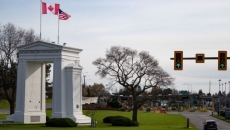The B.C. Supreme Court will not grant an injunction to stop tree removal in Vancouver's Stanley Park after a group claimed the work was doing more harm than good.
The court ruled this week that the challenge raised "novel" issues about whether park users were owed a duty of care by the city and park board, but it would be "unlikely" that a trial would establish such a duty.
The case was filed by park users Michael and Katherine Caditz, Anita Hansen and Jillian Maguire, who claim the removal of trees because of a looper moth infestation caused them "emotional and psychological harm."
They claim the city and the park board were negligent in ordering the tree removal work, relying on a "fundamentally flawed report" by a forestry consulting company hired to carry out the logging work.
Plaintiff Michael Caditz says he and his fellow plaintiffs disagree with the court's ruling, but no trial date to hear the case in full has been set.
Caditz says they are exploring other legal options because they still believe the decision to cut down thousands of trees in the park was based on "bad science," and that upcoming logging activity in the park should be halted.
"We feel there was gross negligence involved and we disagree with the judge's decision and we're analyzing the decision to determine how to proceed," Caditz said in an interview on Thursday.
He said they consulted a number of experts who agreed that the "logging operation that's being done is not necessary."
"It's causing more harm than good," Caditz said. "It's creating an elevated risk of falling trees and a fire and that there's no basis at all in science, in evidence-based science for the logging operation."
The B.C. Supreme Court declined to issue an injunction before a trial, finding that "before anything as extensive as the potential removal of 160,000 trees in Stanley Park is effected, there is time" for the park board to fulfil "its statutory obligations with respect to the care and management of Stanley Park."
The court also found that there's also a legal avenue for "a public law challenge, by way of judicial review, to any decision to proceed with tree removal beyond that contemplated for the 2024/2025 window, if warranted."
The city and park board's lawyer, Ian Dixon, did not immediately respond to a request for comment on the court's ruling.






